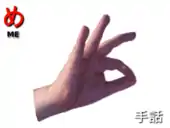Me (kana)
め, in hiragana, or メ in katakana, is one of the Japanese kana, each of which represents one mora. Both versions of the kana are written in two strokes and represent [me].
| Form | Rōmaji | Hiragana | Katakana |
|---|---|---|---|
| Normal m- (ま行 ma-gyō) |
me | め | メ |
| mei mee mē |
めい, めぃ めえ, めぇ めー |
メイ, メィ メエ, メェ メー |
| me | |||
|---|---|---|---|
| |||
| transliteration | me | ||
| hiragana origin | 女 | ||
| katakana origin | 女 | ||
| Man'yōgana | 売 馬 面 女 梅 米 迷 昧 目 眼 海 | ||
| spelling kana | 明治のメ Meiji no "me" | ||
| unicode | U+3081, U+30E1 | ||
| braille | |||
| Note: These Man'yōgana originally represented syllables with one of two different vowel sounds, which merged in later pronunciation | |||
| kana gojūon | ||||||||||||||||||||||||||||||||||||||||||||||||||||||||||||
|---|---|---|---|---|---|---|---|---|---|---|---|---|---|---|---|---|---|---|---|---|---|---|---|---|---|---|---|---|---|---|---|---|---|---|---|---|---|---|---|---|---|---|---|---|---|---|---|---|---|---|---|---|---|---|---|---|---|---|---|---|
|
||||||||||||||||||||||||||||||||||||||||||||||||||||||||||||
| yori · koto · hentaigana | ||||||||||||||||||||||||||||||||||||||||||||||||||||||||||||
Stroke order
 Stroke order in writing め |
 Stroke order in writing メ |

Stroke order in writing め

Stroke order in writing メ
Other communicative representations
| Japanese radiotelephony alphabet | Wabun code |
| 明治のメ Meiji no "Me" |
|
|
 |
 | |
| Japanese Navy Signal Flag | Japanese semaphore | Japanese manual syllabary (fingerspelling) | Braille dots-123456 Japanese Braille |
- Full Braille representation
| め / メ in Japanese Braille | |
|---|---|
| め / メ me | めい / メー mē/mei |
| Preview | め | メ | メ | ㋱ | ||||
|---|---|---|---|---|---|---|---|---|
| Unicode name | HIRAGANA LETTER ME | KATAKANA LETTER ME | HALFWIDTH KATAKANA LETTER ME | CIRCLED KATAKANA ME | ||||
| Encodings | decimal | hex | decimal | hex | decimal | hex | decimal | hex |
| Unicode | 12417 | U+3081 | 12513 | U+30E1 | 65426 | U+FF92 | 13041 | U+32F1 |
| UTF-8 | 227 130 129 | E3 82 81 | 227 131 161 | E3 83 A1 | 239 190 146 | EF BE 92 | 227 139 177 | E3 8B B1 |
| Numeric character reference | め | め | メ | メ | メ | メ | ㋱ | ㋱ |
| Shift JIS[1] | 130 223 | 82 DF | 131 129 | 83 81 | 210 | D2 | ||
| EUC-JP[2] | 164 225 | A4 E1 | 165 225 | A5 E1 | 142 210 | 8E D2 | ||
| GB 18030[3] | 164 225 | A4 E1 | 165 225 | A5 E1 | 132 49 154 54 | 84 31 9A 36 | ||
| EUC-KR[4] / UHC[5] | 170 225 | AA E1 | 171 225 | AB E1 | ||||
| Big5 (non-ETEN kana)[6] | 198 229 | C6 E5 | 199 121 | C7 79 | ||||
| Big5 (ETEN / HKSCS)[7] | 199 104 | C7 68 | 199 221 | C7 DD | ||||
| Look up め or メ in Wiktionary, the free dictionary. |
References
- Unicode Consortium (2015-12-02) [1994-03-08]. "Shift-JIS to Unicode".
- Unicode Consortium; IBM. "EUC-JP-2007". International Components for Unicode.
- Standardization Administration of China (SAC) (2005-11-18). GB 18030-2005: Information Technology—Chinese coded character set.
- Unicode Consortium; IBM. "IBM-970". International Components for Unicode.
- Steele, Shawn (2000). "cp949 to Unicode table". Microsoft / Unicode Consortium.
- Unicode Consortium (2015-12-02) [1994-02-11]. "BIG5 to Unicode table (complete)".
- van Kesteren, Anne. "big5". Encoding Standard. WHATWG.
This article is issued from Wikipedia. The text is licensed under Creative Commons - Attribution - Sharealike. Additional terms may apply for the media files.

